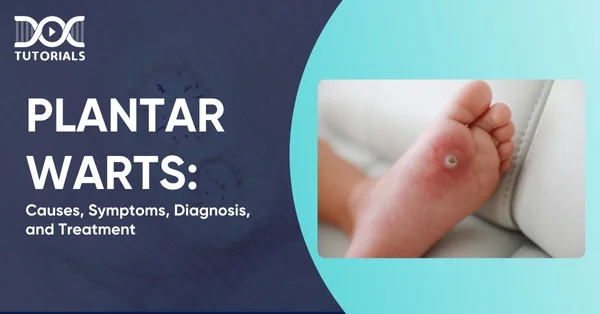Plantar Warts | Know the Causes, Symptoms, and Cure

Infection of your feet that causes pain and rough lesions is termed plantar warts. Though proper and timely treatment helps cure this condition completely, it can cause certain discomfort if left untreated.
Being a NEET PG aspirant, you need to have a detailed idea of such medical conditions in order to cover your syllabus, along with performing accurate diagnoses in clinical settings.
Read on to learn more about its causes, symptoms, risk factors, and treatment.
What are Plantar Warts?
Scientifically called verruca plantaris, plantar warts appear on your feet’s soles as rough bumps. These warts on your feet are usually benign (non-cancerous) in nature and develop when your body is infected with HPV (human papillomavirus).
What Causes Plantar Warts?
The primary cause of plantar warts is HPV infection. Above 100 types of HPV viruses exist, out of which a few cause foot warts. However other HPV viruses also cause warts, but they typically occur on different parts of the skin or on mucous membranes.
Plantar warts occur when the HPV virus enters a person’s body through small cuts, weak spots, or breaks on the bottom of the foot. It is often found on the soles of your feet or outer skin layer.
Most cases of plantar warts are harmless and typically resolve on their own without treatment. However, for children, it may take a year or two. Meanwhile, for adults, it can take even longer.
What are the Risk Factors of Plantar Warts?
Anyone can develop warts on foot, but the following individuals are at higher risk:
- Individuals having HIV/AIDS or those with weak immunity
- Senior citizens above 65 years of age
- Teenagers and children
- Individuals with autoimmune diseases who need to take medicines to suppress their immune system
- Those who have a history of plantar warts
- White people
Walking barefoot in areas such as locker rooms, pools, or shared gym spaces increases your risk of contracting plantar warts, as these environments often harbour the virus. Group activities that require bare feet, such as yoga or martial arts, can also spread warts. Even your home shower might contain the virus.
What are the Symptoms of Plantar Warts?
Here are some of the common symptoms of plantar wart:
- A lesion that appears fleshy and forms a solid border
- Small, grainy, rough lesion on the heel or ball of the foot, toes, etc.
- A lesion with black or dark spots
- Feeling pain when you squeeze the lesion’s outer margin
- Yellowish and hard overlying skin
- Warts on your foot’s load-bearing area will cause pain while walking
- The normal skin pattern or lines of your foot will get disrupted due to lesions caused by foot warts
- Mosaic wart or multiple lesions on your foot in the same area
How to Diagnose Plantar Warts?
A healthcare provider can usually identify a plantar wart just by examining the affected area. They may gently remove the top layer of the wart with a scalpel to look for small black dots, which are actually tiny blood vessels.
In some instances, if the diagnosis isn’t clear, the provider might take a small tissue sample (biopsy) from the bump and send it to a laboratory for further analysis to check for the presence of HPV. Biopsy results typically come back within a few days, helping confirm whether the growth is indeed a plantar wart.
What are the Treatment Options for Plantar Warts?
Here are some of the common and effective treatment options for plantar warts:
- Cryotherapy
In this method, liquid nitrogen is applied to the wart by professionals at their clinic. As this process may cause pain, your healthcare provider will numb the area before proceeding.
Once nitrogen is applied, the warts turn into blisters, and the dead cells will fall off the blister soon. The wart may not go away after the first session. Therefore, you will need to visit the clinic multiple times, as advised by your doctor, to undergo repeat cryotherapy.
- Salicylic Acid Peeling Medicines
Your doctor will prescribe a peeling medicine that contains salicylic acid for regular use. This helps slowly remove the wart layers from your skin. However, a follow-up visit or treatment may be required to assess the improvement.
Sometimes, doctors also shave the wart surface from your skin and use a wooden toothpick to apply trichloroacetic acid to the area. This treatment may require repeated visits to the clinic every week for the procedure.
- Laser Therapy
When over-the-counter medicines fail to cure warts on the foot, doctors recommend laser therapy. It helps destroy the blood cells that supply blood to HPV-infected tissues. Laser therapy can effectively remove warts on your feet.
- Vaccines or Immunotherapy
Sometimes, doctors use immune therapy to help your body fight plantar warts. This approach involves injecting the wart with an antigen or applying special creams or solutions to boost your immune response against the virus causing the warts.
- Surgery
If the above procedures are not effective, doctors may recommend surgery. In this case, the doctors perform curettage and electrodesiccation (using an electric needle to cut the wart away). However, this process can cause permanent scars on the individual’s skin.
FAQs About Plantar Warts
- Can plantar warts be treated at home?
Home remedies for plantar warts include applying tea tree oil twice daily, using over-the-counter freezing sprays to mimic cryotherapy, and covering the wart with duct tape to help it disappear gradually.
- How to prevent plantar warts?
To prevent warts, avoid walking barefoot in communal areas, keep your shoes and feet clean and dry, and avoid contact with individuals who are infected with the HPV virus.
- Is plantar wart a contagious disease?
The HPV virus responsible for plantar warts is highly contagious. It can spread easily to other parts of your body or other people through direct contact or by touching contaminated surfaces, such as floors in communal locker rooms.
- Can plantar warts occur on your fingers or hands?
HPV from plantar warts can also infect your hands or fingers, causing palmar warts. To prevent spreading, avoid touching warts, wash hands after contact, and keep warts covered with a plaster.
Conclusion
Plantar warts are infections on your feet caused by the HPV virus. To stay protected from this infection, it is essential to learn about its symptoms and causes. Moreover, if you are a NEET PG aspirant, it is necessary to have a deeper understanding of this topic, as it is included in the syllabus.
In this regard, you can rely on DocTutorials. We provide top-rated study materials, conduct engaging online classes, and provide high-quality video lectures from expert faculty to guide you through the NEET PG journey.
Join our NEET PG course and take your exam preparation to the next level!
Latest Blogs
-

NEET SS Exam 2024: Analysis, Key Dates, Counselling
The NEET SS 2024 exam kicked off on March 29, 2025. Over two days and two slots, candidates across 13…
-

NEET PG Registration 2025: An Essential Guide For Exam Prep
The NEET PG registration, which is conducted online, is a crucial step in the exam process. Filling out the NEET…
-

NEET PG Syllabus 2026: A Must-Have Complete Guide for Exam Success
The NEET PG Syllabus acts as one of the foundation stones for aspiring postgraduate medical students like you who are…




